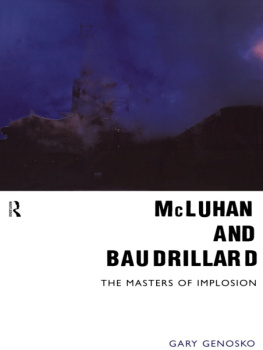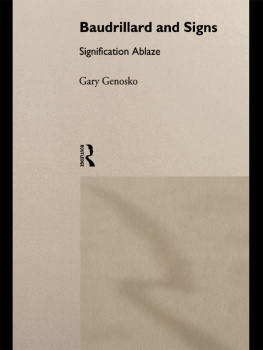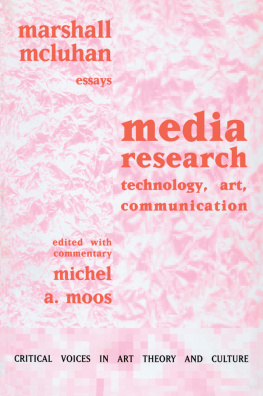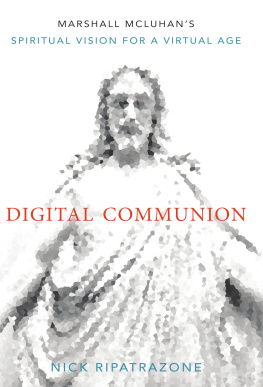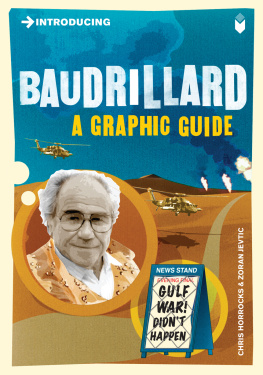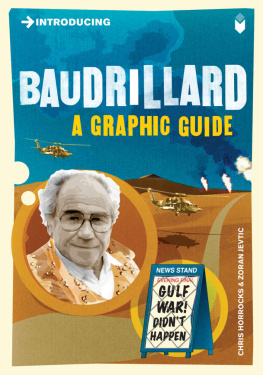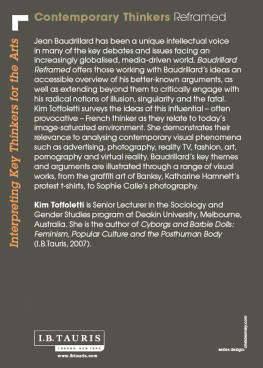McLUHAN AND BAUDRILLARD
McLuhan and Baudrillard is a supremely confident handling of the emergence of McLuhanismin its French context. Genosko has just the right kind of expertise to bring this off, and he doesit. This crisply written text is astute and perceptive, with a fine grasp of the central issues, andwill appeal to undergraduates and postgraduates across a wide spectrum of disciplines.
Mike Gane, Loughborough University
Marshall McLuhan, the media guru of the 1960s, has not been forgotten. Almost two decadesafter his death, a McLuhan renaissance is under way, fuelled by the very developments in newmedia technologies he long ago predicted. His famous buzzphrases, the medium is themessage and the Global Village, are once again in circulation. Setting out the theoretical andhistorical context of this renaissance, McLuhan and Baudrillard: The Masters of Implosiontraces the impact of McLuhans ideas on French cultural life and in postmodern theory.
Tracing parallels between the so-called McLuhan Cult of the 1960s and the BaudrillardScene of the 1980s, Gary Genosko explores how McLuhans ideas persist and are distortedthrough Baudrillards work, via concepts such as semiurgy, participation, reversibility, theprimitive/tribal and implosion. He argues that it is through Baudrillards influence thatMcLuhanism has had its greatest impact on contemporary cultural thought and practice.
Gary Genosko is Senior Research Fellow of the McLuhan Program in Culture and Technologyat the University of Toronto.
First published 1999
by Routledge
11 New Fetter Lane, London EC4P 4EE
Simultaneously published in the USA and Canada
by Routledge
29 West 35th Street, New York, NY 10001
This edition published in the Taylor & Francis e-Library, 2001.
1999 Gary Genosko
All rights reserved. No part of this book may be reprinted or reproduced or utilized in anyform or by any electronic, mechanical, or other means, now known or hereafter invented,including photocopying and recording, or in any information storage or retrieval system,without permission in writing from the publishers.
British Library Cataloguing in Publication Data
A catalogue record for this book is available from the British Library
Library of Congress Cataloging in Publication Data
Genosko, Gary.
McLuhan and Baudrillard : the masters of implosion / Gary Genosko.
Includes bibliographical references and index.
1. McLuhan, Marshall, 1911 Influence. 2. France Intellectual life 20th century. 3.Baudrillard, Jean. 4. Mass media Philosophy. I. Title.
P85.M23G46 1999
302.230922dc21 98-48297
CIP
ISBN 0-415-19061-4 (hbk)
ISBN 0-415-19062-2 (pbk)
ISBN 0-203-00521-X Master e-book ISBN
ISBN 0-203-17396-1 (Glassbook Format)
DEDICATED TO MY FATHER, ERNEST
ACKNOWLEDGMENTS
Much of the research for this book was supported by a postdoctoral fellowship from theSocial Sciences and Humanities Research Council of Canada. This fellowship enabled me toconsult the McLuhan Papers in the National Archives in Ottawa, Canada. My old friendJon Gardiner put me up and put up with me in Ottawa. Derrick de Kerckhove, the directorof the McLuhan Program in Culture and Technology at the University of Toronto, providedmoral and intellectual support and stimulation, racking his brain for details of events thathappened decades ago in response to my obscure questions, and opening his files to me.
I was also provided with the unique opportunity to try out this book in the form ofcyber-lectures delivered through the Cyber-Semiotic Institute at the University of Toronto.I would like to thank the master of cyber-ceremonies, Paul Bouissac, and the Institutesdesigner, Jamieson Cochrane, for their impressive work. Goodbye virtual students, whoeverand wherever you are!
I particularly profited from discussions with Mike Gane about the relationship betweenMcLuhan and Baudrillard. Nicholas Zurbrugg helped me publicly air some dirty Canadianlinen about contemporary trends in McLuhanism. Richard G. Smith kept me posted aboutrecent developments in the Baudrillard belt of the Midlands, and William Merrin did hisbest to get me to slow down and give others a chance. Brian Rigby sent me a delightfulpamphlet on the French translation of Richard Hoggart containing the wonderful line fromLeeds-born poet Tony Harrison: An Eccles cakes my petite madeleine! Arthur Krokerprovided me with his press kit. And JB was amazed that I had written a second book abouthim, and that it was on McLuhan. Todd Dufresne made sure I didnt forget my psychoanalyticinterests. Samir Gandesha and Ben Freedman heard me out on the topics in this book far intomany nights. Tanis Kyle and Steve Raizen provided technical assistance.
Hannah, my daughter, and Rachel, my partner, continue to give me the most importantkind of support.
I first met Marshall McLuhan in the late 1970s when I was a freshman at the Universityof Toronto. A few years later, while I was still an undergraduate, the news that the University had decided to close his famous research center so shortly after his death taught me avaluable lesson about academic politics that I have never forgotten.
Since I was a child my fathers workshop was filled with televisions of every shape anddescription. Only the emphasis has changed: working on televisions has given way tothinking about television.
Winnipeg, May 1998
INTRODUCTION
For better and for worse, a McLuhan renaissance is in full swing. Although many of his booksare still out of print and his journals such as The Dew-Line Newsletter and Explorations haveacquired rare book status in some quarters, Marshall McLuhan, a thinker of the end of thebook, is at home in todays electronic environments where he has been firmly and very muchposthumously ensconced; he has even been elevated to the status of, in some instances, asaint. He is, to be precise, a patron saint of Wired magazine and a regular virtual sidekick ofCamille Paglia. In order to understand why McLuhan is again on the menu, McLuhan andBaudrillard: The Masters of Implosion considers the diffusion and lasting effects of his ideasprimarily in France and secondarily in Qubec.
My first step in understanding McLuhan today is to place him in historical perspectiveamong the francophones. The French reception of McLuhan cannot, of course, be isolatedfrom his international influence in the 1960s and 1970s. Further work needs to done on hisinfluence in Japan, for instance, with special attention given to the debates over the relevanceof the cult of McLuhanism in the Tokyo press recounted to McLuhan in unpublishedcorrespondence with Kenichi Takemura (MP 38/80). From the very outset it needs to bestated that this book does not Frenchify McLuhan but, rather, concerns itself with theMcLuhanization of French intellectuals and media workers interested and operating in creativecommunications and media environments in general. I also owe a debt to the rhetoric, still verymuch in evidence, of figuring French intellectuals as if they were in some manner equivalent toMcLuhan or French McLuhans.
The debates in French intellectual circles around McLuhans ideas not only raged widelyand intensely during the decades of his greatest influence in the 1960s and 1970s, but theeffects of these debates are still being felt today. The McLuhan renaissance is a secondcoming, of sorts: another quasi-global outpouring of interest and influence tied once again toemerging communications technologies and information systems, and the cunning of capital asit expands into, and transforms for its own ends, these new infrastructures. McLuhanismremains compatible with capitals new means of expansion in the deregulated, post-industrial cyberscape. During the 1980s, McLuhans work had largely disappeared from view. Myinvestigation of McLuhans French reception puts this latency period into perspective. The1980s were also the period of the Baudrillard Scene, a pop intellectual phenomenon thatspread like wildfire through English-speaking countries in the same delirious manner asMcLuhans notions had done earlier in the 1960s and 1970s. For Baudrillard was, for manycritics, the postmodern scene par

